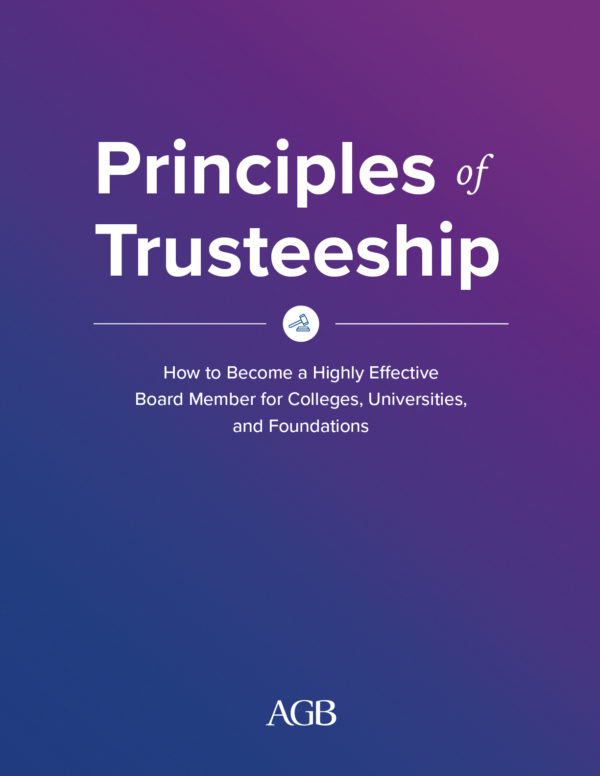Books
Principles of Trusteeship | Order the Complete Guide
How to Become a Highly Effective Board Member for Colleges, Universities, and Foundations
PRINT EDITION
$54.00
(Member Price $36.00)

PRINT EDITION
$54.00
(Member Price $36.00)
Contents
- Foreword by Henry Stoever
- Introduction
- UNDERSTAND GOVERNANCE
- Principle 1: Embrace the full scope of your responsibilities.
- Principle 2: Respect the difference between the board’s role and the administration’s role.
- Principle 3: Be an ambassador for your institution and higher education.
- LEAD BY EXAMPLE
- Principle 4: Conduct yourself with impeccable integrity.
- Principle 5: Think independently and act collectively.
- Principle 6: Champion justice, equity, and inclusion.
- THINK STRATEGICALLY
- Principle 7: Learn about the mission, constituents, culture, and context.
- Principle 8: Focus on what matters most to long-term sustainability.
- Principle 9: Ask insightful questions and listen with an open mind.
- A Call to Action
Title Information
- A bulk discount is available for orders of 10 or more copies.
- Publication Year: 2021
- ISBN: 978-1-951635-03-9
- 56 pages
Learn more:
Testimonials:
“The Principles of Trusteeship provide an essential tool for individual board members to achieve the highest level of effective service. I highly recommend that boards and senior leaders use these practical principles to benchmark their performance and develop strategies to maximize board performance during these challenging times.”
Augustana College
“As the title of this publication denotes, these are principles, not practices or policies. Principles are not negotiable or discretionary. Practices and policies, on the other hand, can and sometimes should be adapted to local circumstances. The nine principles presented here—all sound, realistic, and intertwined—map the genetic code of effective trustees.”
Harvard Graduate School of Education
Former Trustee, Wheaton (Massachusetts), Goucher, and Maryville Colleges
“While the board acts as a collective, it can only govern wisely and well if it has members who act in accordance with the principles of trusteeship.”
Trustee, The College of New Jersey
“I wish I had been provided a copy of a book like this when I served on an educational institution’s governing board. The Principles of Trusteeship is the secret sauce that can help guide all board members to excel at the highest levels of good governance.”
University System of Maryland Foundation
“I read Principles of Trusteeship, which I think is probably the best AGB publication I’ve seen to date in 10 years. I love that piece. It’s helped us be better trustees, be better senior staff, and, I dare say, better leaders of our campus.”
Colby College

